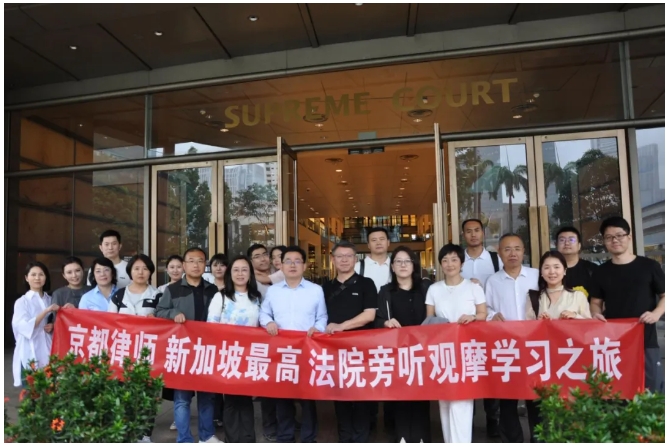On 10 January 2025, a group from King&Capital's Criminal and Employment Departments visited the Supreme Court of Singapore to observe and learn from an extraterritorial judiciary.

The delegation was warmly received by the staff of the Supreme Court of Singapore, in particular by Zhou Qiang, who had received the former President of the Supreme People's Court of China. He introduced in detail the operating mechanism of the Singapore courts, including the trial process, court structure and the unique features of the judicial procedures, which are significantly different from the court organisational system in China.
Guided by the staff, members of the delegation visited the hardware facilities of the Supreme Court of Singapore in all aspects. From the layout of the courtroom to the setup of the bench, as well as the application of the electronic litigation system and remote trial technology, every detail reflects the rigour and efficiency of the Singapore judicial system. Among them, the layout of the courtroom is significantly different from that in China, which has left an extremely deep impression on the members.
In a typical civil court in Singapore, the seating arrangements for plaintiffs and defendants are very different from those in China. Domestic trial of civil cases, usually the plaintiff's seat on the right, the defendant's seat on the left, the two sit opposite; but in Singapore's civil court, the plaintiff and the defendant are sitting in the same row, was the left and right side-by-side layout (both facing the judge's bench), the middle of the 1.2 metres to share the channel. According to staff introduction, this design weakens the adversarial context, more in line with the ‘collaborative dispute resolution’ concept advocated by Singapore.
During the visit, members of the delegation had an in-depth discussion with the Singapore court staff on the similarities and differences between the two countries. These discussions not only enhanced mutual understanding, but also laid the foundation for future legal exchanges.
During the visit, Ms Zhang Sijia also shared an interesting experience of visiting a library. When she approached the library, she was stopped by the staff, so she said ‘I'm a lawyer, I want to go in’ in poor English, and the staff immediately let them in, and then found a Chinese aunt to communicate with them. It was only after the exchange that they understood that only legal practitioners, such as lawyers, prosecutors, judges and so on, are allowed to consult the books in the court library, and they are not allowed to borrow them. This experience made everyone feel that lawyers, no matter which country they come from, can enjoy certain professional privileges in the Supreme Court of Singapore. It also gave the delegation a deep appreciation of the respect that the Singapore judiciary has for lawyers, not only in the design of the system, but also in the daily details. This respect is not only a recognition of the professional value of lawyers, but also an important symbol of the civilisation of the rule of law.
King&Capital Law Firm has always been committed to promoting international legal exchanges, and will continue to strengthen its co-operation with the legal institutions of various countries in the future, so as to contribute to the promotion of mutual understanding and respect in the global legal community.
The visit of the delegation of King&Capital Law Firm to the Supreme Court of Singapore was not only an exchange of legal culture, but also a clash of legal visions. In the context of globalisation, international legal exchanges are particularly important. It is hoped that through such activities, understanding and co-operation among the legal professions of various countries can be enhanced, and the progress of the global rule of law can be jointly promoted.



